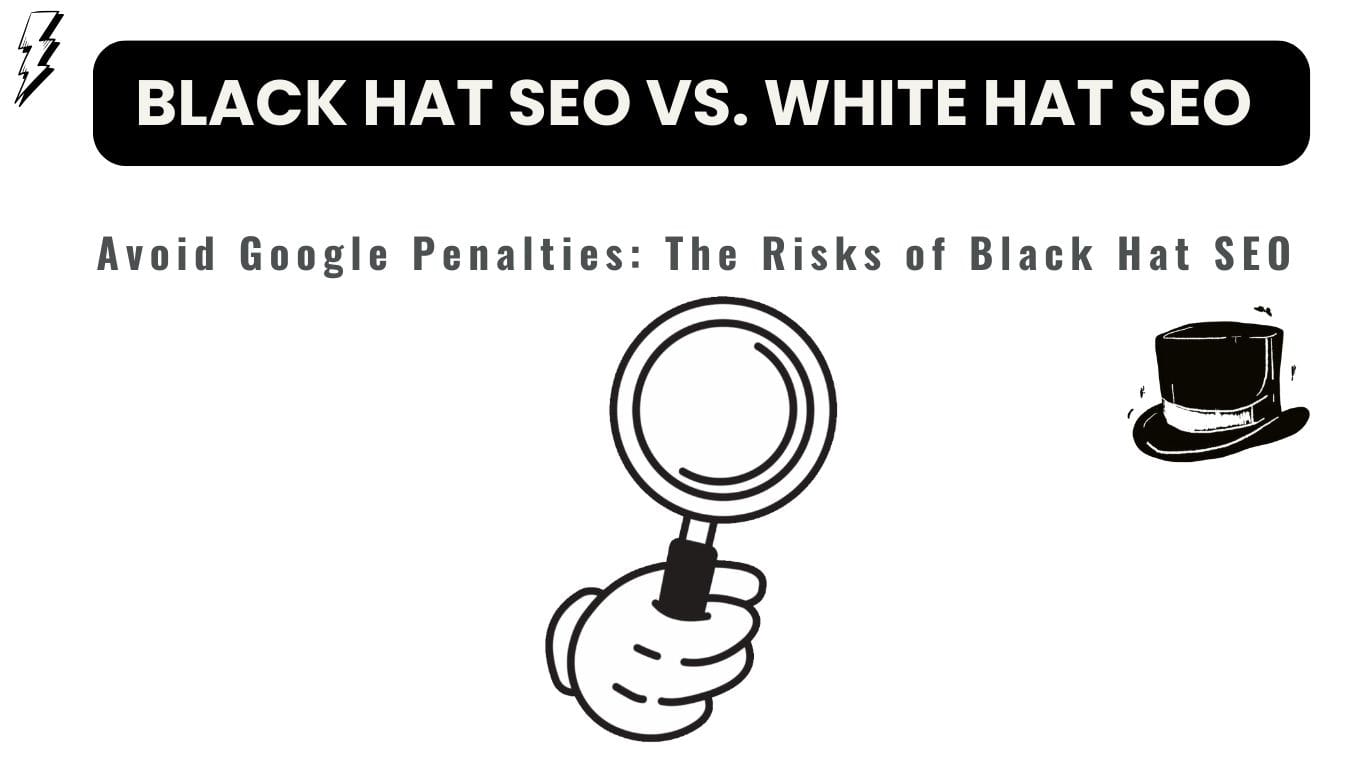This SEO guide will explain the two widely known approaches of SEO, White hat SEO and Black hat SEO. Their strategies, and which SEO technique you should follow in your SEO journey.
As we know, in real life there are always two ways to do everything “right way or wrong way”. Similarly in SEO there are two ways to rank your website, right way is organic SEO or “white hat technique” and the wrong way is Black Hat technique.
White Hat SEO vs Black Hat SEO
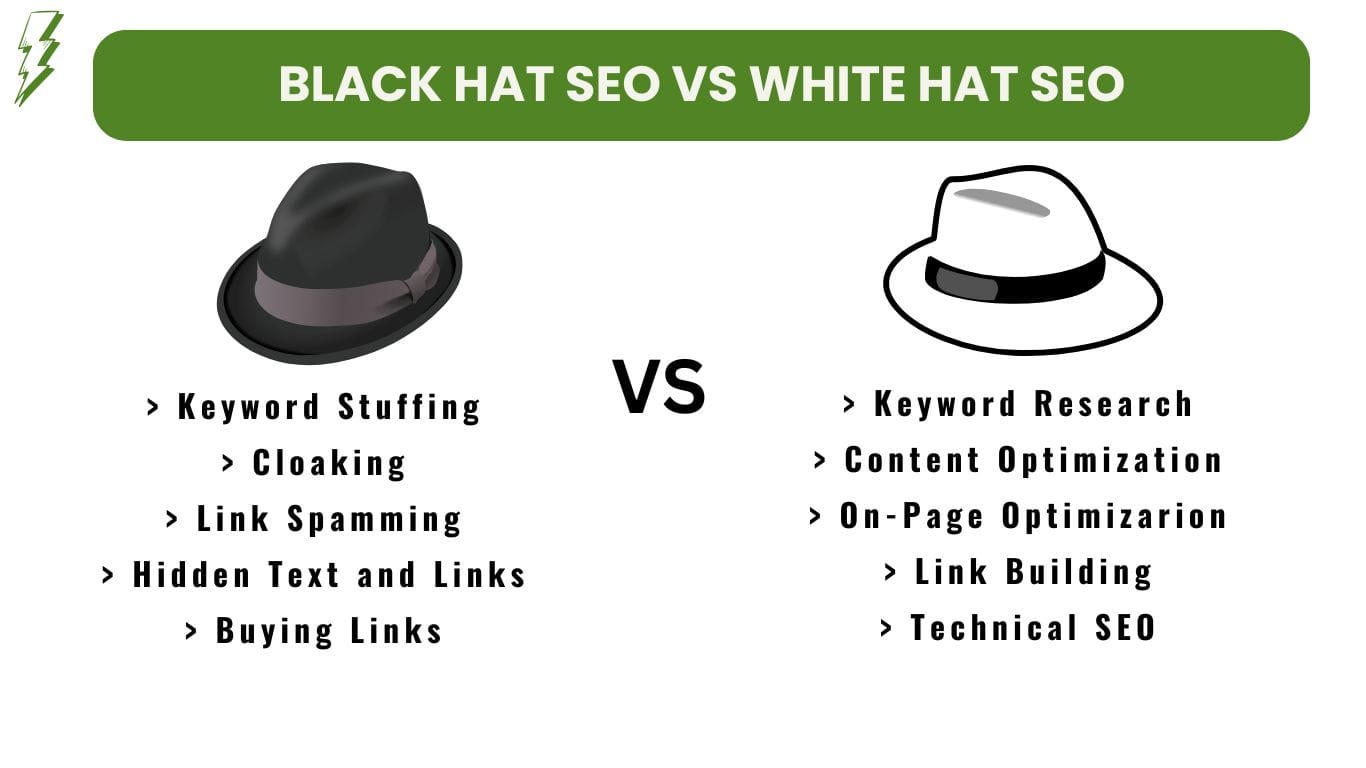
White hat and black hat are types of SEO that are categorized on the basis of their different strategies, and different techniques.
In white hat SEO we focus on the human audience, we try to satisfy our real audience by providing relevent and better results in return of their search query. While in black hat SEO we focus on manipulating search engines algorithm to get higher ranking.
What is Black Hat SEO or Unethical SEO
Black Hat SEO or unethical SEO, is the combination of some SEO strategies that are restricted by search engines. This SEO technique uses unethical tactics and loopholes to manipulate search engine algorithms and achieve higher rankings.
These tactics often violate search engine guidelines and can lead to penalties, including website de-indexing. The impact of this approach might show results quicker but in long term it will negatively impact your website.
Some common Black Hat SEO techniques include
- Keyword Stuffing: Overusing exact match keywords to manipulate search engine rankings.
- Duplicate Content: Using content that is already indexed. Paraphrasing is also a part of it.
- Cloaking: Presenting different content to users and search engines. e.g HTML clocking, Javacript clocking and client server clocking.
- Link Spamming: Creating low-quality backlinks to artificially boost a website’s authority.
- Hidden Text and Links: Using text and links that are invisible to users but visible to search engines.
- Buying Links: Paying for backlinks to manipulate search engine rankings. Link Spamming and Link Farming are also considered black hat technique.
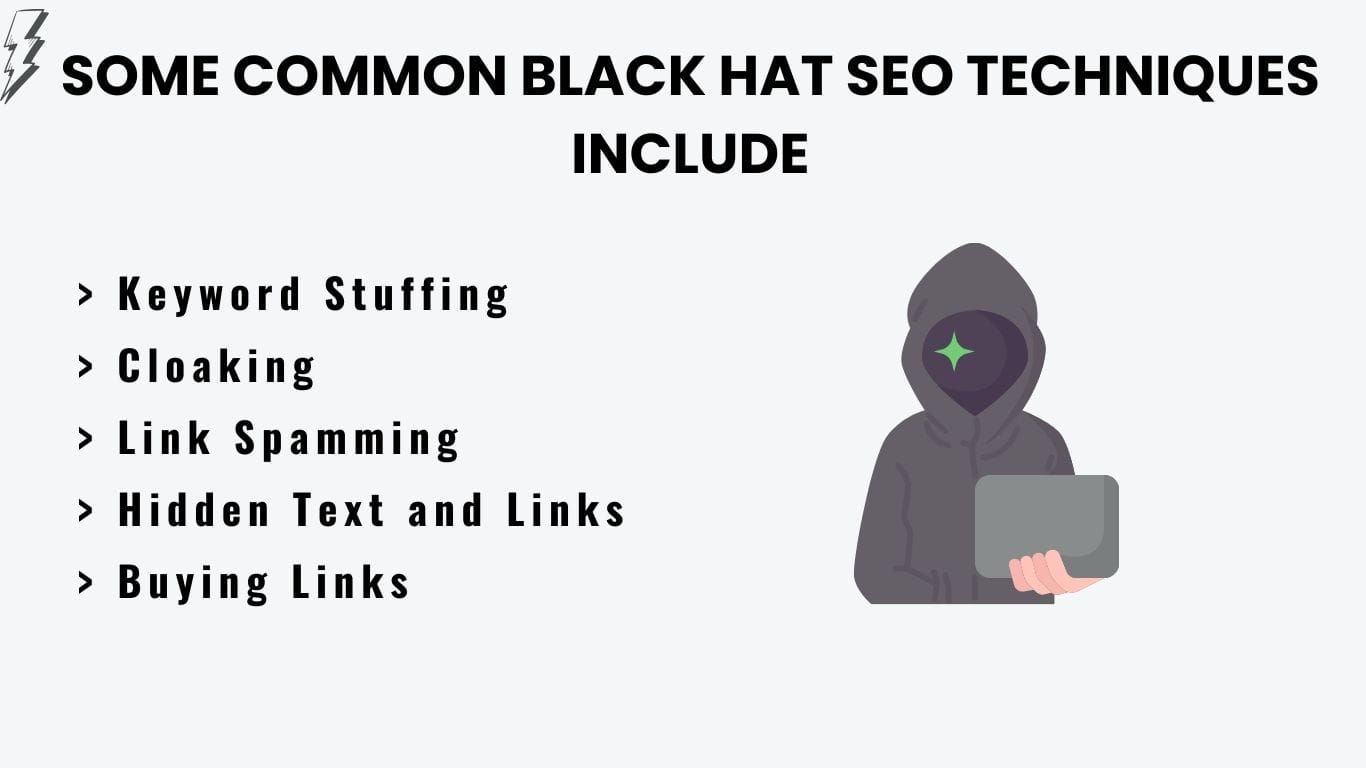
What is White Hat SEO? Organic SEO/Ethical SEO
White Hat SEO also called ethical SEO because everything done in ethical way. Another term is Organic SEO which means doing SEO in the right way or naturally. So, the techniques of SEO in which you follow the guidlines of search engines or follow the restrictions of search engine its called White Hat SEO techniques.
In white hat approach, we do SEO following the rules set by search engine and rank our website on (S-E-R-P). It focuses on creating high-quality content, building natural backlinks, and optimizing website technical aspects.
Some key White Hat SEO techniques include
- Keyword Research: Identifying relevant keywords and incorporating them naturally into content.
- On-Page Optimization: Optimizing website elements like title tags, meta descriptions, and header tags.
- Content Creation: Producing high-quality, informative, and engaging content.
- Backlink Building: Acquiring high-quality backlinks from reputable websites.
- Technical SEO: Optimizing website technical aspects like site speed, mobile-friendliness, and XML sitemaps.
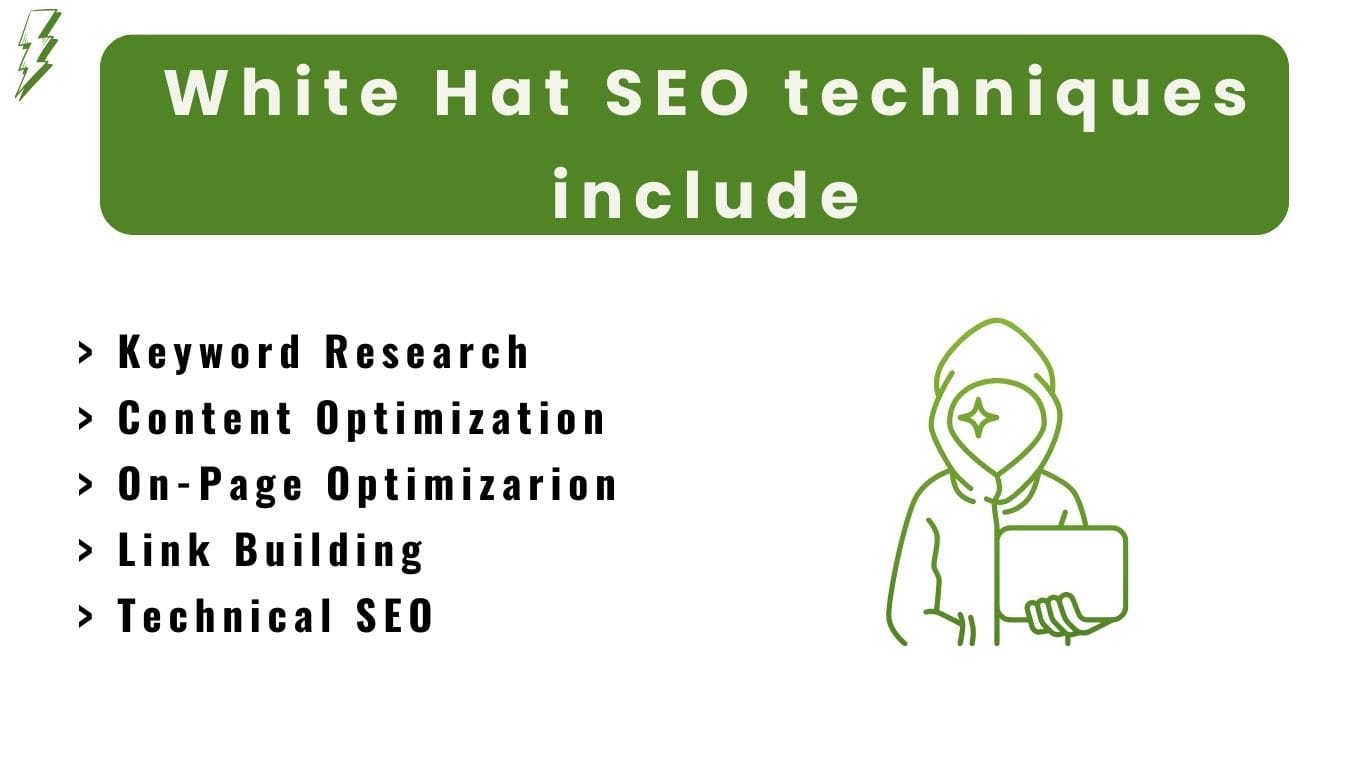
Black Hat SEO Tools

some tools and techniques have been historically used for Black Hat, though their use is highly discouraged:
- Automated Link Building Tools: GroupHigh, Help A Reporter Out (HARO), These tools can be used to create low-quality, spammy backlinks, which can harm your website’s reputation.
- Article Spinning Tools: These tools can generate low-quality, spammy content by rephrasing existing content.
- Cloaking Tools: These tools can display different content to users and search engines, which is a clear violation of search engine guidelines.
- Keyword Stuffing Tools: These tools can overstuff keywords into content, which can harm your website’s ranking.
It’s important to note that using these tools can result in severe penalties from search engines.
Always prioritize ethical SEO practices and focus on creating high-quality, user-friendly content.
Why White Hat SEO is the Better Choice
While Black Hat may offer quick results, but it’s a risky approach that can harm your website’s reputation and long-term success. White Hat, on the other hand, provides sustainable and ethical results.
Here are some reasons why you should choose White Hat SEO:
- Long-Term Benefits: White Hat strategies are designed to provide long-term benefits, as they focus on building a strong foundation for your website.
- Improved User Experience: White Hat emphasizes creating high-quality content that is valuable to users, leading to improved user experience and higher engagement.
- Avoid Penalties: Black Hat techniques can lead to penalties from search engines, which can severely damage your website’s visibility.
- Ethical Approach: White Hat adheres to ethical principles and avoids manipulative tactics.
How long does it take to see results from White Hat SEO?
The time it takes to see results from White Hat varies depending on various factors, including the competitiveness of your niche, the quality of your content, and the strength of your backlink profile. Typically, it can take several months to see significant improvements.
How can I ensure that I’m using White Hat SEO techniques?
To ensure you’re using White Hat, focus on creating high-quality content, building natural backlinks, and optimizing your website for both users and search engines.
Avoid any tactics that manipulate search engine rankings or deceive users.
What are the risks of using Black Hat SEO?
Black Hat SEO can lead to severe penalties from search engines, including a complete ban from search results. It can also damage your website’s reputation and negatively impact your brand.
Is it worth it to use Black Hat SEO?
No, it’s not worth it. Black Hat techniques are risky and can have devastating consequences. It’s always best to focus on ethical, long-term SEO strategies.
What Is Grey Hat SEO?
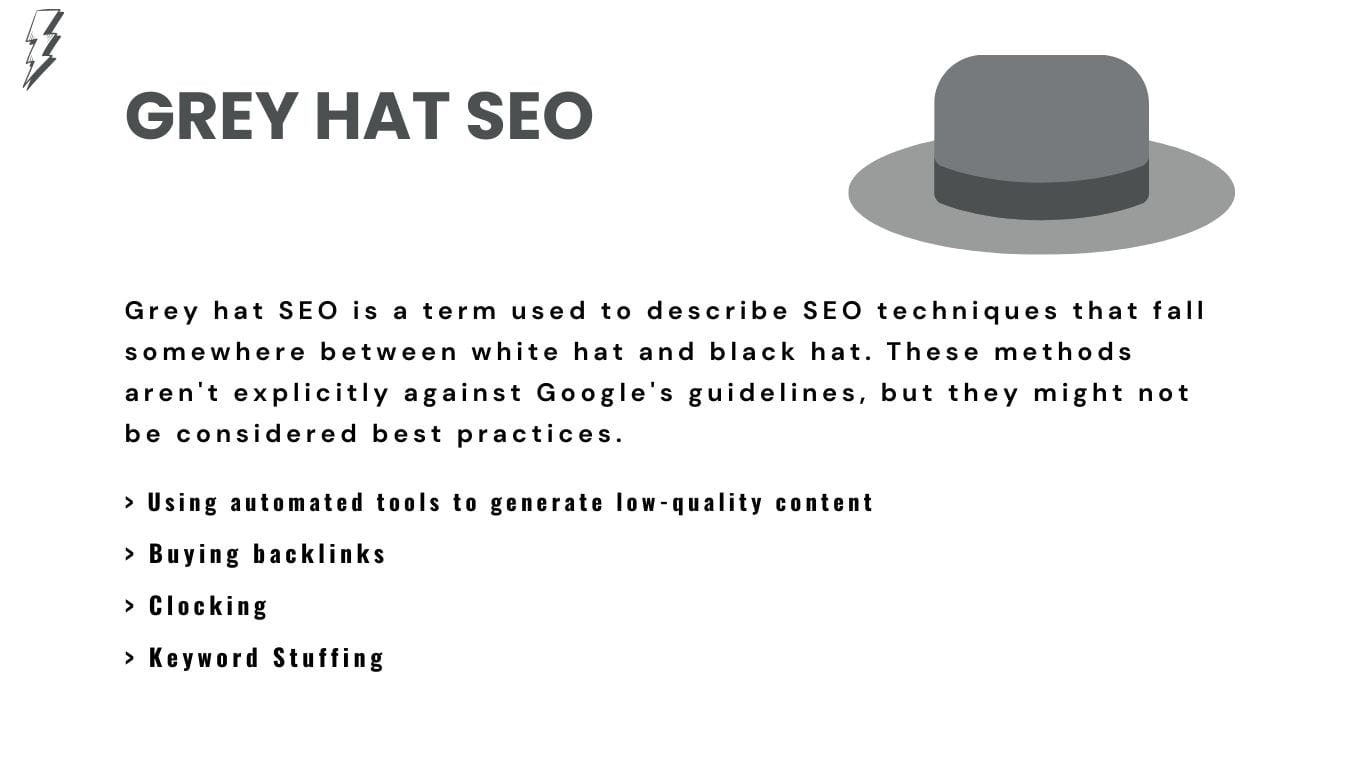
Grey hat SEO is a term used to describe SEO techniques that fall somewhere between white hat and black hat. These methods aren’t explicitly against Google’s guidelines, but they might not be considered best practices.
Here are some examples of grey hat SEO:
- Buying backlinks: While not directly against guidelines, buying backlinks can be seen as an unnatural way to build links.
- Using automated tools to generate low-quality content: This can lead to content that is thin, spammy, and of little value to users.
- Cloaking: This involves showing different content to search engines and users.
- Keyword stuffing: Overusing keywords in content to manipulate search engine rankings.
While these tactics might yield short-term results, they can also lead to penalties from search engines. It’s generally recommended to stick to white hat SEO practices to ensure long-term success.
Conclusion
By understanding the difference between Black Hat SEO and White Hat SEO, you can make informed decisions about your SEO strategy. While Black Hat SEO may offer quick wins, it’s a risky approach that can have negative consequences. White Hat SEO, on the other hand, is a sustainable and ethical approach that can help you achieve long-term success.

